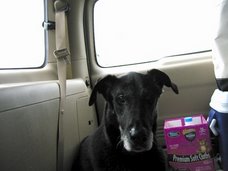I stumbled on to this article at HighlightsParents.com. It's by an educational psychologist, mom, and entrepreneur who believes that as parents we need all the support we can get.
Amen to that Dr. Schwager.
The advice is similar to our Tips for Traveling with Kids series. Although I must draw the line at making up a new word unless it's both useful and fun to say. Kidcation isn't really either, in my opinion.
Vacationing with Your Kids
By Istar Schwager, Ph.D.
Vacations with kids are so different from vacations without kids that they may deserve their own name. Kidcations? Anticipating my first vacation after becoming a mother, I imagined sleeping late, taking long quiet walks, spending afternoons reading, and enjoying candlelit dinners with my husband. The reality was that I awoke before 6 A.M., prepared baby food in an ill-equipped cabin, trekked tons of baby paraphernalia to the beach, and sacked out by 8 P.M. We had fun, but in an entirely different way than I'd pictured. Later I laughed at myself for being fooled by the "vacation" word.
Here are some thoughts on making "kidcations" enjoyable for the whole family.
Have Realistic Expectations
Take into consideration your kids' ages, interests, and need for activity as you plan your itinerary. Be realistic. You can still do many of the things that fit your agenda, but don't expect your kids to morph into different beings while on vacation. While a change of location may bring out the camper, historian, or marine biologist in a child, most kids are not turned on by "beautiful scenery" and aren't going to have much tolerance for looking at every last picture in a museum. Make sure that at least some of the activities you plan are oriented to your kids' interests.
Get Kids Involved in Planning
The more kids are involved in planning, the more they will feel like true family-vacation participants. Before taking off, help them look up destinations on maps. Encourage them to plan what to take, discussing what will be needed, what you can do without, and the amount of baggage space allocated. If you have a chance, read with them about where you'll be going and help them become familiar with the names of places and anticipated activities. Share a sense of discovery as you research your plans.
Reassure Kids During Transitions
Kids, especially younger children who have a less-developed understanding of time and distance, may find travel confusing and disruptive. Bringing a favorite stuffed animal or other transitional object can be very comforting. It's also important to help kids anticipate what will happen. Phrases such as "next week," "soon," and "we're almost there" can be translated into more concrete descriptions, such as "by the time we sing three more songs" or "we'll be sleeping at Grandma's seven days." You could even give your kids a calendar that shows where you'll be and what you plan to do each day.
Keep Up Old Routines or Create Some New Ones
Find a balance between old and new. See if it works to read a bedtime story and stick to regular bedtimes while on vacation. You may also want to create special vacation routines--for instance, taking a family walk every morning or playing a board game after dinner each night.
Engage Kids While Traveling
To keep kids engaged and excited about the vacation, help them read maps, watch for road signs, look at changes in topography, and play the kinds of car and travel games that encourage observation and discussion. Kids can also be encouraged to be in charge of their own small travel bag, to have a pre-set amount to spend at a roadside store, and to try new foods and activities.
Be Aware of Pacing
Whether you're traveling by car, plane, or train--kids need time to move around. The "are we there yet?" question isn't just about bathroom stops and boredom. Try to plan your route so that your children have opportunities to stretch their legs. Parks, zoos, and playgrounds along the way provide a chance for kids to let off steam. Providing opportunities for movement will cut down on the whining and acting out that can result from normal, predictable restlessness.
Encourage Kids to Record Their Experiences
To help make the vacation their own, kids can take photos, draw pictures, send postcards to friends back home, and even keep a travel journal. These are great ways for kids to express their reactions to what they are doing and seeing and to keep their skills active during the school break.
Although they take some extra planning and effort, family vacations allow you to share experiences, talk together, tell family stories, sing, play games, and bond in ways that may be hard during the regular year. Whether you're vacationing in Paris, France, or Paris, Texas, camping near a stream or visiting your great-aunt Irma--I hope that you and your kids have a relaxed and memorable vacation this summer.
Istar Schwager, Ph.D., is an educational psychologist, mom, and founder of Creative Parents, Inc., with the website creativeparents.com. She believes that as parents we need all the support we can get.
June 2007





No comments:
Post a Comment